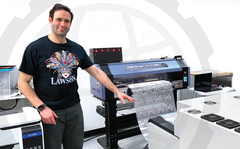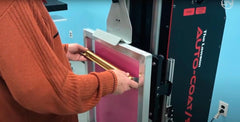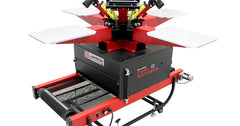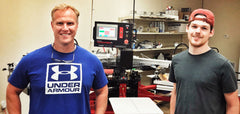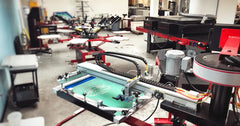If you find yourself stuck or having trouble, read through this article to help troubleshoot.
Frequently Asked Screen Printing Questions
We have compiled a list of questions we get from customers all the time.
How many washes should a screen printed shirt last? That depends. If a shirt is hardly worn, and thus, hardly washed, it will last much longer than a shirt that is worn and washed once a week. As a general rule, a properly printed and cured shirt should be in great shape after at least 50 washes. To help extend the life of your printed shirt, wash it inside out and in cold water. If you want to go even a step further, line dry your t-shirt instead of putting through the dryer. This will especially help if it is a 50/50 or 100% polyester
Do I have to use a special plastisol ink to do simulated process printing? Simulated process printing, or SIM, is the use of regular opaque inks to simulate separation process inks. There are some inks that are packaged as “sim process” inks. These help you in creating simulated process colors. You can actually adjust those colors to get an even closer representation to the final result you want to achieve. Mix your own Pantone color or order a specific pantone to really dial in your colors. When printing a simulated process you should use a higher mesh count. This will help hold your halftones better. Printing through higher mesh counts means mixing in a thinner or curable reducer on these inks so that they better flow through the mesh you are using.
At what point should I be upgrading from my manual to an automatic press? There are a few ways to decide when to get an automatic t-shirt press. First and foremost, if you want to increase your quality of life you should get an automatic. Being able to print with an automatic screen printing machine relieves so much stress on your body. The difference will be night and day - no more tired arms, elbows and back.
For those prioritizing the bottom line, look at the increased capability an automatic brings. Printing faster means being able to accept more jobs. More jobs directly translates to increased revenue. Here is a quick comparison between a manual screen printing shop and one using an automatic screen printing machine.
| Manual Press | Automatic Press | |
| Jobs | 10 | 10 |
| Screens | 30 | 30 |
| Shirts | 1000 | 1000 |
| Time at 15 min screen setup | 20 hours | 11.5 hours (250 shirts/hour) |
In this example, an automatic would cut your production time nearly in half. For shops with a higher overhead, an automatic press will make an even bigger difference.
Should I push or pull my squeegee? This is the age old question that is discussed ad nauseum. The short answer is to do what works for you. If your prints look good, you’re doing it right. If you pull, there is an increased chance of a smoother pass due to better muscle control. However, the pulling motion, unlike a pushing motion, flexes the squeegee rubber. By putting pressure on the squeegee, you utilize the durometer in moving plastisol ink through your screen.
The advantage of pushing the squeegee is less strain on your body. A pushed squeegee “sheers” the top of the ink off of the stencil and puts less ink through. If your printers are pushing the squeegee purely to save their bodies from the strain of pulling, it is time to get an automatic.
How many coats of emulsion should be applied? The amount of emulsion you put on your screen printing frame is technically called emulsion over mesh (EOM). Different people have different opinions and generally speaking, everyone thinks they are the best manual coater. However, the very nature of coating a screen by hands means there are inconsistencies between people and even screen to screen when coated by the same person. Popular coating techniques are 1+1, 2+1 and 2+2. These numbers refer to how many passes of emulsion are put on each side of the screen. The more coats you put on your screen, the bigger the emulsion builds up. This creates a higher EOM. A thicker emulsion deposit increases the amount of ink that is put on your shirt.
Hopefully this article gave you the answers that you were looking for. If you are a beginner screen printer you might find our articles Learn How T-Shirts Are Printed or How to Start a Screen Printing Business to be helpful guides as well. If at any point you still are struggling with screen printing, don't hesitate to call us at 314.382.9300 or to fill out our contact form. We have skilled screen printing experts and silk screen equipment techs on standby 24/7/365.


